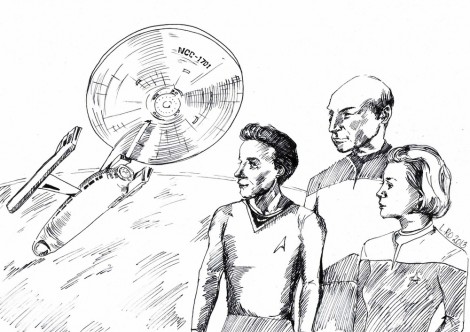The first-ever Toronto Science Festival (TSF) took place September 27–29 at various venues around U of T. One event in the program was the Star Trek Half-Marathon. On Friday night, people interested in science and Star Trek came to Innis Town Hall to watch one episode from each of three different Star Trek series. All episodes were strategically chosen to fit with the TSF theme: “Life in the Universe.”

LUCINDA YAE-RIM RO/THE VARSITY
During the night’s half-marathon, Spock and Kirk encounter a homicidal but misunderstood silicon-based life form; Picard and Troi make first contact with a planet full of technologically inferior humanoids with bumpy foreheads; and Janeway and Chakotay struggle against a race of technologically advanced yet dogmatic aliens that evolved from dinosaurs.
After each episode, astronomy professor and TSF organizer Michael Reid joined sci-fi author Peter Watts in leading a discussion fuelled by participation from the audience.
Star Trek holds a special place in the lives of both guests: Reid held the long-running show partially responsible for his career choice, while Watts learned from Star Trek that “[i]f you’re a starship captain, you get laid a lot.”
In addition to providing witty remarks, the two speakers guided conversation that ranged from questioning the feasibility of a silicon-based organism to discussing the shortcuts in creativity taken by the show, which diminish its value as a work of science fiction.
The discussion contained as much fan-love as it did criticism; undoubtedly, Spock himself would have found this event “fascinating.”
The Varsity spoke with Michael Reid after the tsf was over and asked him about Star Trek, science outreach, and funding for scientific research. Reid started watching Star Trek: The Next Generation as a ten-year-old. One of his favourite characters was Dr. Crusher because even though “she didn’t get a lot of screen time and could get kind of boring story-lines,” he liked that Crusher and Geordi La Forge were playing key roles on the Enterprise as scientists, as opposed to the other military-type characters.
When asked about the new Star Trek movies, Reid replied: “They’re okay… one thing I always liked about Star Trek was that it was about exploration … amazing experiences of awe and wonder … and not so much on blowing stuff up… [The new movies] were more focused on blowing stuff up than I would have liked.”
As a key member of the TSF’s organizing committee, Reid has high aspirations to expand the event: “Our goal was to launch a festival that would ultimately be as big as Nuit Blanche or TIFF or Luminato or any of these other really big festivals that go on in Toronto.” Reid went on to explain why he thinks science outreach is important. Reid answers: “A scientifically literate society is a healthy society. People have to make really important decisions about things like, most recently, climate change. If you don’t have a basic level of scientific literacy, it’s hard to function well in a scientific, technological society.”
There are also things that are intrinsically interesting that Reid wants to share with others, and those things aren’t always practical. “A lot of people think of science as though it is a commercial activity … they want you to come up with things that can be marketed and used in some way,” he said.
Reid feels this mentality will eventually lead to stagnation: “Research in one area forks into another area, unexpectedly.” He uses the camera as an example of an invention that came not from someone trying to get more people to buy their company’s cell phone, but rather from astronomy — from scientists trying to improve upon using giant photographic plates.
On the future of the TSF, Reid says that “we probably will [do it again]” and “if people are interested, they should let us know.”


